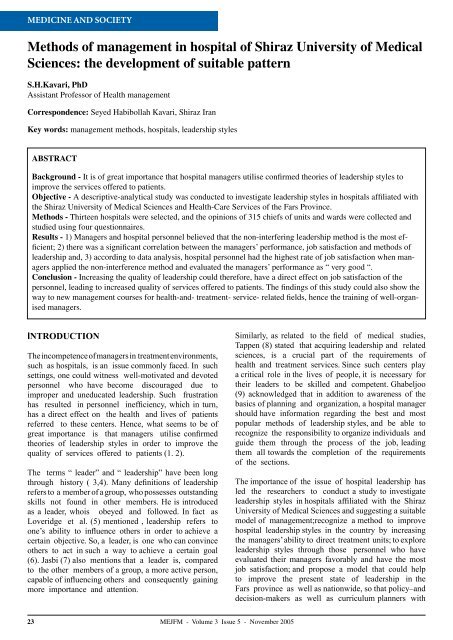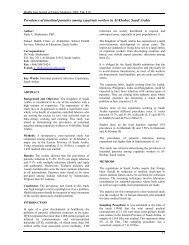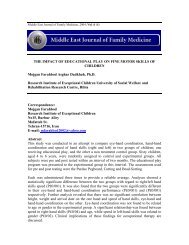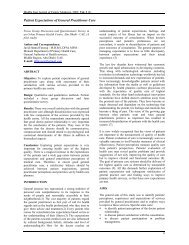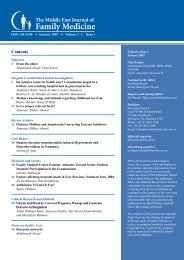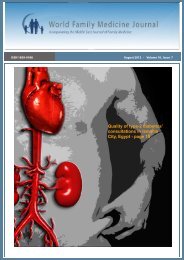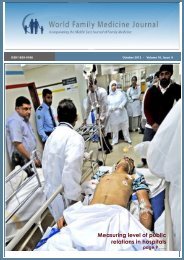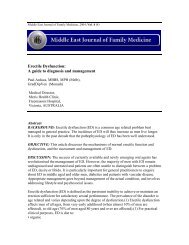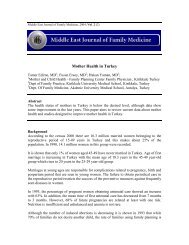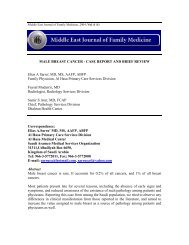Contents - Middle East Journal of Family Medicine
Contents - Middle East Journal of Family Medicine
Contents - Middle East Journal of Family Medicine
You also want an ePaper? Increase the reach of your titles
YUMPU automatically turns print PDFs into web optimized ePapers that Google loves.
MEDICINE AND SOCIETY<br />
Methods <strong>of</strong> management in hospital <strong>of</strong> Shiraz University <strong>of</strong> Medical<br />
Sciences: the development <strong>of</strong> suitable pattern<br />
S.H.Kavari, PhD<br />
Assistant Pr<strong>of</strong>essor <strong>of</strong> Health management<br />
Correspondence: Seyed Habibollah Kavari, Shiraz Iran<br />
Key words: management methods, hospitals, leadership styles<br />
ABSTRACT<br />
Background - It is <strong>of</strong> great importance that hospital managers utilise confirmed theories <strong>of</strong> leadership styles to<br />
improve the services <strong>of</strong>fered to patients.<br />
Objective - A descriptive-analytical study was conducted to investigate leadership styles in hospitals affiliated with<br />
the Shiraz University <strong>of</strong> Medical Sciences and Health-Care Services <strong>of</strong> the Fars Province.<br />
Methods - Thirteen hospitals were selected, and the opinions <strong>of</strong> 315 chiefs <strong>of</strong> units and wards were collected and<br />
studied using four questionnaires.<br />
Results - 1) Managers and hospital personnel believed that the non-interfering leadership method is the most efficient;<br />
2) there was a significant correlation between the managers’ performance, job satisfaction and methods <strong>of</strong><br />
leadership and, 3) according to data analysis, hospital personnel had the highest rate <strong>of</strong> job satisfaction when managers<br />
applied the non-interference method and evaluated the managers’ performance as “ very good “.<br />
Conclusion - Increasing the quality <strong>of</strong> leadership could therefore, have a direct effect on job satisfaction <strong>of</strong> the<br />
personnel, leading to increased quality <strong>of</strong> services <strong>of</strong>fered to patients. The findings <strong>of</strong> this study could also show the<br />
way to new management courses for health-and- treatment- service- related fields, hence the training <strong>of</strong> well-organised<br />
managers.<br />
INTRODUCTION<br />
The incompetence <strong>of</strong> managers in treatment environments,<br />
such as hospitals, is an issue commonly faced. In such<br />
settings, one could witness well-motivated and devoted<br />
personnel who have become discouraged due to<br />
improper and uneducated leadership. Such frustration<br />
has resulted in personnel inefficiency, which in turn,<br />
has a direct effect on the health and lives <strong>of</strong> patients<br />
referred to these centers. Hence, what seems to be <strong>of</strong><br />
great importance is that managers utilise confirmed<br />
theories <strong>of</strong> leadership styles in order to improve the<br />
quality <strong>of</strong> services <strong>of</strong>fered to patients (1. 2).<br />
The terms “ leader” and “ leadership” have been long<br />
through history ( 3,4). Many definitions <strong>of</strong> leadership<br />
refers to a member <strong>of</strong> a group, who possesses outstanding<br />
skills not found in other members. He is introduced<br />
as a leader, whois obeyed and followed. In fact as<br />
Loveridge et al. (5) mentioned , leadership refers to<br />
one’s ability to influence others in order to achieve a<br />
certain objective. So, a leader, is one who can convince<br />
others to act in such a way to achieve a certain goal<br />
(6). Jasbi (7) also mentions that a leader is, compared<br />
to the other members <strong>of</strong> a group, a more active person,<br />
capable <strong>of</strong> influencing others and consequently gaining<br />
more importance and attention.<br />
Similarly, as related to the field <strong>of</strong> medical studies,<br />
Tappen (8) stated that acquiring leadership and related<br />
sciences, is a crucial part <strong>of</strong> the requirements <strong>of</strong><br />
health and treatment services. Since such centers play<br />
a critical role in the lives <strong>of</strong> people, it is necessary for<br />
their leaders to be skilled and competent. Ghabeljoo<br />
(9) acknowledged that in addition to awareness <strong>of</strong> the<br />
basics <strong>of</strong> planning and organization, a hospital manager<br />
should have information regarding the best and most<br />
popular methods <strong>of</strong> leadership styles, and be able to<br />
recognize the responsibility to organize individuals and<br />
guide them through the process <strong>of</strong> the job, leading<br />
them all towards the completion <strong>of</strong> the requirements<br />
<strong>of</strong> the sections.<br />
The importance <strong>of</strong> the issue <strong>of</strong> hospital leadership has<br />
led the researchers to conduct a study to investigate<br />
leadership styles in hospitals affiliated with the Shiraz<br />
University <strong>of</strong> Medical Sciences and suggesting a suitable<br />
model <strong>of</strong> management;recognize a method to improve<br />
hospital leadership styles in the country by increasing<br />
the managers’ ability to direct treatment units; to explore<br />
leadership styles through those personnel who have<br />
evaluated their managers favorably and have the most<br />
job satisfaction; and propose a model that could help<br />
to improve the present state <strong>of</strong> leadership in the<br />
Fars province as well as nationwide, so that policy–and<br />
decision-makers as well as curriculum planners with<br />
23<br />
MEJFM - Volume 3 Issue 5 - November 2005


